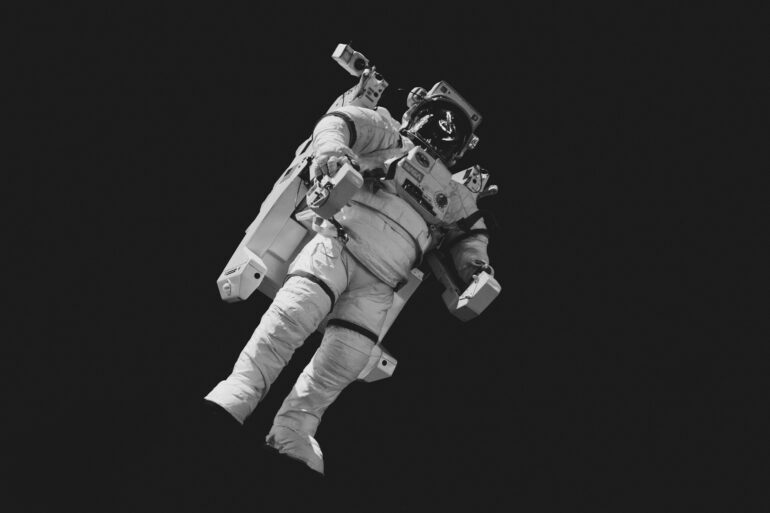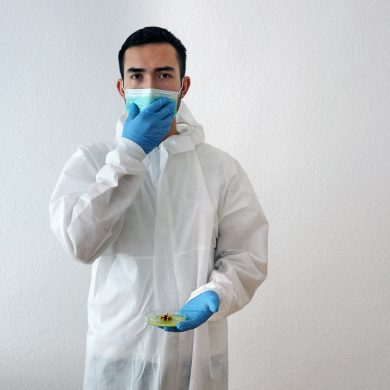Since I was a kid, I have been obsessed with space since there is so much we don’t know about it yet. How can we travel out there? Are there any other forms of life? One particular question that always intrigued me was how space travel affects humans, as we are so far away from what we need to stay safe and protect ourselves.
A sizeable protective measure that’s present on Earth is the atmosphere. The atmosphere and magnetic field protect humans from large amounts of radiation from space. The ozone layers of our atmosphere prevent excess ultraviolet (UV) radiation from reaching us by absorbing harmful UV particles, especially UVB. However, when these protective measures are unavailable in space, the radiation exposure, especially UVB, drastically increases. (Make sure to pack SPF 1000+ before your next trip to space). In space, the vacuum results in a lack of an atmosphere and ozone layers, our protectors. Radiation from the sun and cosmic rays interfere with the body’s natural processes and can cause cancer, degenerative diseases, and radiation sickness. There are various methods by which this can happen, many of which are due to heavy ion exposure. For example, exposure to carbon ions contributes to the breakage of chromosomes during mitosis, or when exposed to high-energy iron and silicon ions, the growth pathways associated with bronchial epithelial cells (cells that line the airway paths in the lungs) are upregulated, potentially leading to lung cancer. Additionally, exposure to certain heavy ions can decrease programmed cell death and increase rapid cell growth, leading to the start of tumors.
The sudden increase in exposure to radiation that occurs in space is coupled with a sudden decrease in gravity acting on the body. A lack of gravity can interfere with many bodily processes since we are accustomed to a force pulling us down. One such process is the daily destruction and reconstruction of bones. Without gravity, bones have very little weight to support, so the natural process of degeneration and regeneration is disrupted. Bones naturally break down and rebuild over time. However, when there’s no gravity, there’s less weight on the bones, leading to less regeneration since the bones don’t need to be as dense to support a heavy weight. Overtime this causes a degradation of the bone mass, known as disuse osteoporosis. The calcium from the bones gets into the bloodstream and, combined with dehydration, can lead to kidney stones. Muscles are also broken down since they are not used as much. With no gravity to act against, the muscles aren’t under constant stress like they are on Earth, so they break down.
Zero gravity can also alter sensory and motor skills. Fluids on Earth are pulled down because of gravity. However, in space, they have no specific direction to flow in, so they kind of just float around. The same happens with bodily fluids (thank god astronauts don’t just pee into space). Some bodily fluids help maintain a sense of awareness of the orientation and location of the body, which is known as proprioception. Shifts from the normal patterns of flow of these fluids may cause eye problems and lead to sensory reweighting. The vestibular senses, which occur in the ear, determine the head’s orientation and help keep the body upright. This relies on inner ear fluid. The motion of the fluid alerts the brain as to how the head is positioned and can trigger motor responses based on this information. This is why you may sometimes feel like you are falling while lying down: your inner ear fluid will move similarly to when you are falling. Since the fluid flow is unreliable in space, the brain tends to rely more on the vision and proprioception senses to gather information on its surroundings and the body’s orientation. Like the circulatory system, these senses take a while to readjust once back on Earth. Astronauts face post-flight orthostatic intolerance, where they cannot maintain blood pressure while standing up. The body is not yet accustomed to pumping blood against gravity.
Although space travel seems fascinating, the effects of being away from home significantly affect the body. Radiation and zero gravity put the body through physical stressors and may lead to diseases like osteoporosis or cancer. It can also change the way certain bodily functions occur. However, the reward of space travel far outweighs the challenges, and hopefully one day all the kids obsessed with space will have a lot more to learn about.
https://www.nasa.gov/hrp/bodyinspace
https://www.nasa.gov/missions/station/bone-and-muscle-loss-in-microgravity/
https://www.ncbi.nlm.nih.gov/pmc/articles/PMC8577506/
https://unsplash.com/photos/astronaut-in-white-suit-in-grayscale-photography-I0fDR8xtApA

